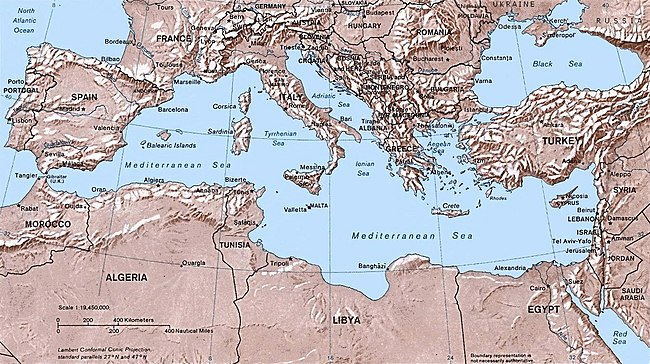
Posted on 06/17/2007 4:55:52 PM PDT by blam
GGG Ping.
well, that would confirm what the ancient Romans supposed through their legends, and what Virgil immortalized in the Aeneid.
There is always more truth to ancient legend and myth than most people give it credit for.
It is quite amazing how often Heroditus is vindicated.
True - and myth is a entirely different language and form of communication of ideas that modern people are simply no longer capable of understanding.
I like the idea that the old historian appears to be right again.
The roman legends and the Aeneid - worthy masterpiece as it is - are about the Romans themselves and their linkage to Troy. This is regarding the Etruscans who predated Troy.
The tree-rings worldwide indicate a significant cooling event occurred in 1159BC. Coolness = dryness and dryness = famine. So...the Etruscans may have migrated because of the 1159BC event.
Lydia was actually on the west coast of Anatolia, not the south coast...not too far from the area of Troy. The Romans believed they were descended from the Trojan Aeneas, who had survived the fall of Troy and made his way to Italy, but the Etruscans seem to have had an interest in Aeneas as well--probably earlier. There are at least 17 vases from the 6th and 5th centuries BC showing Aeneas, 10 from the one Etruscan city of Vulci.
Perhaps there is some connection between the Trojan refugee legends and the Lydian legends. Herodotus claims to be giving the Etruscans' own version of their past, and a number of other Greek historians also assumed it to be true.
Interesting!
DNA Boosts Herodotus’ Account of Etruscans as Migrants to Italy
NY Times | April 3, 2007 | NICHOLAS WADE
Posted on 04/04/2007 12:27:29 AM EDT by neverdem
http://www.freerepublic.com/focus/f-news/1811652/posts

Please FREEPMAIL me if you want on or off the
"Gods, Graves, Glyphs" PING list or GGG weekly digest
-- Archaeology/Anthropology/Ancient Cultures/Artifacts/Antiquities, etc.
Gods, Graves, Glyphs (alpha order)
Nice map, but it doesn’t label the location of Lydia. Sardis, the capital, was on a river which flowed west into the Aegean, and was the same latitude as the northern part of the island of Chios (a bit further north than Athens).
The HistoriesThe Lydians have very nearly the same customs as the Greeks, with the exception that these last do not bring up their girls in the same way. So far as we have any knowledge, they were the first nation to introduce the use of gold and silver coin, and the first who sold goods by retail. They claim also the invention of all the games which are common to them with the Greeks. These they declare that they invented about the time when they colonised Tyrrhenia, an event of which they give the following account. In the days of Atys, the son of Manes, there was great scarcity through the whole land of Lydia. For some time the Lydians bore the affliction patiently, but finding that it did not pass away, they set to work to devise remedies for the evil. Various expedients were discovered by various persons; dice, and huckle-bones, and ball, and all such games were invented, except tables, the invention of which they do not claim as theirs. The plan adopted against the famine was to engage in games one day so entirely as not to feel any craving for food, and the next day to eat and abstain from games. In this way they passed eighteen years. Still the affliction continued and even became more grievous. So the king determined to divide the nation in half, and to make the two portions draw lots, the one to stay, the other to leave the land. He would continue to reign over those whose lot it should be to remain behind; the emigrants should have his son Tyrrhenus for their leader. The lot was cast, and they who had to emigrate went down to Smyrna, and built themselves ships, in which, after they had put on board all needful stores, they sailed away in search of new homes and better sustenance. After sailing past many countries they came to Umbria, where they built cities for themselves, and fixed their residence. Their former name of Lydians they laid aside, and called themselves after the name of the king's son, who led the colony, Tyrrhenians.
by Herodotus
tr by George Rawlinson
Book I -- Clio
Where Did The Etruscans Come From?
Etruscology website | June 2002 | Dieter H. Steinbauer
Posted on 08/06/2005 9:08:13 PM PDT by SunkenCiv
http://www.freerepublic.com/focus/f-chat/1458504/posts
http://en.wikipedia.org/wiki/Image:Map_of_Lydia_ancient_times.jpg
http://www.goddess-athena.org/Museum/Temples/Erythrae/Mysia-Lydia_map.html
http://www.goddess-athena.org/Museum/Temples/Notium/Lydia_map.html
Disclaimer: Opinions posted on Free Republic are those of the individual posters and do not necessarily represent the opinion of Free Republic or its management. All materials posted herein are protected by copyright law and the exemption for fair use of copyrighted works.